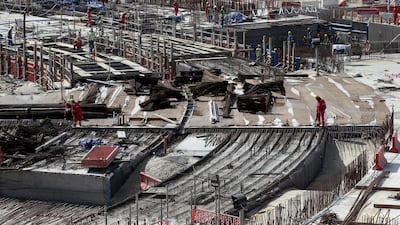The boycott on Qatar by four Arab countries is placing a significant financial strain on preparations for the football World Cup in 2022.
Qatar still needs to build at least eight stadiums, dozens of kilometres of rail and finish a whole city before hosting the world’s most-watched sporting event.
Trade bans imposed by Saudi Arabia, the UAE, Egypt and Bahrain over Qatar’s support for extremism include construction material, meaning Doha has to buy from farther abroad and at higher prices.
Hassan Al Thawadi, secretary general of the Qatari committee in charge of planning and infrastructure for the World Cup, would not give an estimate for the cost overrun.
Before the added costs, Qatar had committed US$200 billion (Dh734bn) to build stadiums, a $35bn metro and rail system, and a new city for 200,000 people. It also set out to double the size of its airport to handle as many as 53 million passengers a year.
But building contractors, who were worried about delayed payments or no payment at all even before the boycotts, “will now likely be exacerbated by it”, said Allison Wood, of the Control Risks advisory in Dubai.
“The goods from new supply chains are often more expensive and a lot of contractors are already operating on quite low margins, so higher costs of material can really cut into their bottom line,” Ms Wood said.
“There’s no doubt that the boycott will put an additional premium on what was already going to be a very expensive World Cup.”
Some of the steel for the projects is being shipped in from Malaysia, instead of neighbouring Saudi Arabia, and China is providing other material.
The event’s reputation had already been hurt by reports that migrant labourers have been abused and earlier suspicions that Qatar won the right to host the tournament through bribery.
But the biggest blow came on June 5, when the four countries cut off air, sea and land connections to push Qatar into accepting a list of 13 demands.
As the diplomatic and commercial boycott approaches its third month, the four nations on Sunday reiterated that Doha must make changes including a stopping support for extremists, closing media outlets that provide them with platforms, and stopping interference in the internal affairs of its fellow GCC member states.
Doha has stubbornly refused and insists that the World Cup will go on as planned, despite delays to the infrastructure projects.
At the site of the 40,000-seat Al Wakra stadium last week, cranes swung concrete slabs into place and the whine of jackhammers pierced the air as up to 1,800 labourers worked around the clock to try to finish it by the end of next year.
Contractors say they have had to move fast to find new markets for materials and that this has delayed progress.
With reporting by Bloomberg

